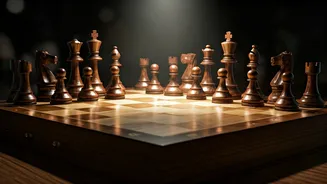Strategic Life Choices
Game theory, often associated with complex strategies, fundamentally analyzes decision-making where the outcome of one person's choice depends on others'
actions. Its principles apply even in seemingly simple situations. Consider the Prisoner's Dilemma, a classic example: two suspects, held separately, must decide whether to cooperate or betray each other. If both cooperate, they receive a light sentence. However, if one betrays the other, the betrayer goes free, while the other receives a harsh sentence. If both betray, both receive a moderate sentence. This dilemma illustrates the tension between cooperation and self-interest, revealing how individuals make choices based on their assessment of others' potential moves. This framework highlights how everyday decisions, from business negotiations to family conflicts, involve a similar interplay of trust, risk, and anticipated responses, making game theory a relevant lens for understanding human behavior.
Negotiating with Children
Even parenting, a field seemingly ruled by emotion, benefits from game theory principles. When negotiating with children, parents unconsciously engage in strategic thinking. They might use techniques like offering rewards to encourage desired behavior (cooperation) or implementing consequences for undesirable actions (defection). For example, a parent might promise a reward if the child finishes their chores. The child, in turn, assesses the benefit of the reward versus the effort required. Similarly, parents might use 'tit-for-tat' strategies, responding in kind to their children's actions; cooperation is met with cooperation, and defiance is met with consequences. This creates a strategic environment where the child learns the value of cooperation and the repercussions of non-compliance. Parents are not simply reacting but strategically crafting interactions to shape their children's behavior, implicitly applying game theory concepts.
Dating and Relationships
The dating world also mirrors game theory concepts. People make decisions about how to present themselves, choosing strategies to maximize their chances of success. A person might choose to appear confident (a form of risk-taking) or cautious (minimizing risk of rejection). Compatibility itself can be understood through a game theory lens, where both individuals seek a stable outcome – a long-term relationship. The process of finding a partner can be seen as a series of strategic interactions. Each date, each conversation, and each expression of interest is a move in a game, where both parties are trying to predict the other's intentions and maximize their chances of forming a lasting bond. Understanding these dynamics can shed light on why certain relationship strategies are more successful than others. The concept of 'signaling' is crucial. Individuals often subtly convey information about themselves – their interests, values, and intentions – in order to attract the right partner, a strategic move within the 'dating game'.
Economics and Markets
In the world of economics, game theory is essential. It helps explain how businesses compete, how markets function, and how individuals make financial decisions. Game theory models provide a foundation for understanding the behavior of economic actors – firms, consumers, and governments. Consider the concept of oligopoly, where a few firms dominate a market. Each firm's pricing and production decisions impact the others. A firm might choose to lower prices to gain market share (a competitive strategy), but this could trigger a price war, leading to lower profits for everyone. Game theory analyzes these strategic interactions. Moreover, auction theory, an important branch of game theory, studies how auctions work and how bidders make strategic decisions to maximize their chances of winning. By understanding the incentives and strategies involved, economic actors can make more informed choices. The strategies can range from bidding carefully to exploiting information asymmetries to gain an advantage in the market.
Political Strategy
International relations and political campaigns are battlegrounds of strategic decision-making. Politicians often use game theory principles to analyze their opponents' moves and formulate strategies. The concept of the 'security dilemma' is a prime example: a nation's efforts to enhance its security can inadvertently threaten other nations, leading to an arms race. Negotiations between countries, such as trade deals or disarmament treaties, can also be analyzed using game theory, where each side tries to gain an advantage while minimizing risks. The Cold War is a historical example of a prolonged game, characterized by a series of strategic interactions between the United States and the Soviet Union. The concept of 'mutually assured destruction' (MAD) exemplifies a game theory outcome, where the threat of retaliation by both sides prevented either from initiating a nuclear strike. Understanding game theory is invaluable for interpreting political events and predicting future actions by world leaders.
Social Dilemmas
Many social issues can be viewed through a game theory perspective. Consider the 'tragedy of the commons,' where individuals, acting in their own self-interest, deplete a shared resource. For example, overfishing in the ocean can lead to the collapse of fish stocks, harming everyone in the long run. Game theory provides insights into how to solve such dilemmas, often by establishing rules, regulations, or incentives to promote cooperation. Environmental concerns like climate change also fall under the domain of game theory. Countries must cooperate to reduce greenhouse gas emissions, but each country may be tempted to free-ride, hoping others will take on the burden. The challenge lies in finding mechanisms to ensure that all parties contribute to the common good. Similarly, in public health crises, individual decisions about vaccination or social distancing affect the collective outcomes. Understanding game theory can help design policies and strategies that encourage pro-social behavior and mitigate social problems.
Sports Strategies
Sports are a rich environment for strategic thinking. Coaches and players constantly make decisions based on probabilities, opponents' likely responses, and desired outcomes. Consider the use of strategic timeouts in basketball or the selection of offensive and defensive plays in American football. Game theory helps analyze the strategic advantages and disadvantages of different plays, helping coaches make informed choices. The concept of mixed strategies, where a player or team randomizes their actions, can be very effective in surprising opponents and making it difficult for them to predict behavior. For instance, a soccer player may decide to alternate between shooting at the goal and passing the ball to a teammate. Sports analysts frequently use game theory to assess performance, understand the psychology of players and teams, and develop optimal strategies for success. The ability to predict opponents' moves and choose the right actions at the right time is often the key to victory.
Evolutionary Biology
Game theory applies to evolutionary biology, analyzing the strategies that have emerged over time. The concept of 'evolutionary stable strategy' (ESS) helps explain why certain behaviors persist in populations. An ESS is a strategy that, if adopted by most members of a population, cannot be invaded by an alternative strategy. Consider the hawk-dove game, which models competition for resources. Hawks are aggressive, while doves are peaceful. In a population, Hawks are in conflict. Doves only display to avoid conflict. If all individuals behave like hawks, the costs of fighting become high, and the population's well-being declines. If most behave like doves, a hawk will be better off by acting aggressive. Thus, the population will reach an equilibrium where both types are present. This provides insights into the evolution of cooperation and conflict in animals and plants. Studying this has aided biologists and researchers in understanding the emergence of traits.
Computer Science and AI
Game theory is a crucial tool in computer science and artificial intelligence. It helps design algorithms that can make strategic decisions in competitive environments. The field of multi-agent systems, where multiple intelligent agents interact, relies heavily on game theory. Think about how search algorithms on the internet work. Search engines compete for users by displaying relevant results. This competition can be modeled as a game, where each engine tries to optimize its ranking and attract user clicks. Likewise, in AI, game theory is used to create agents that can play games, negotiate, and even make decisions in complex real-world situations. The development of AI often involves training agents to play games such as chess or Go, where the optimal strategy depends on the actions of the opponent. The development of these strategies continues to expand into other fields as well, such as robotic coordination and online auctions.
Everyday Decisions & You
Even in seemingly random or routine choices, game theory principles are at play. When you decide to drive to work or take public transport, you're implicitly weighing the costs and benefits of each option. When you choose what to eat for lunch, you are considering a game against hunger. When you send a text and await a response, you're in a min-game, anticipating reactions, assessing risks, and measuring rewards. Understanding these fundamental principles can enhance your awareness of the strategic elements in everyday life. By recognizing the underlying patterns, you gain a deeper understanding of human behavior and strategic interactions. Game theory is not just about complex equations or abstract models; it's a practical framework for making more informed decisions, navigating social situations, and achieving your goals, even in the most mundane aspects of your daily life.






















